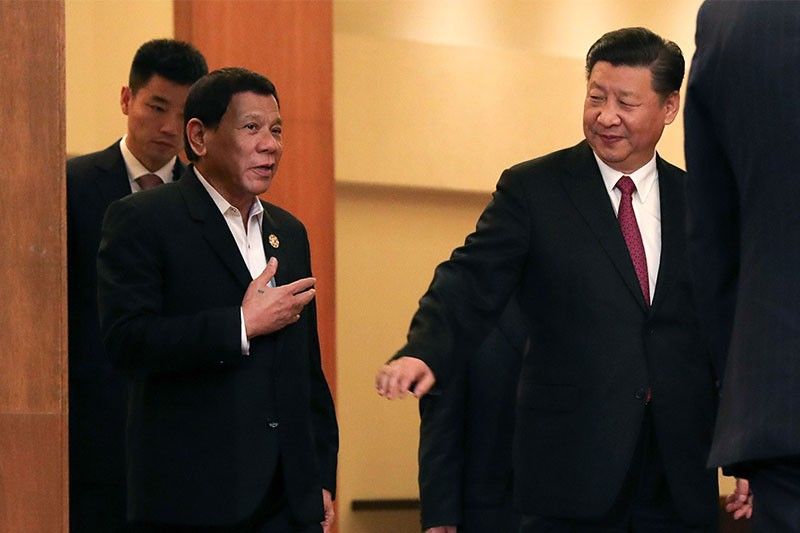Commentary: Pitfalls of a one-sided game with China

In 2016, the United Nations Permanent Court of Arbitration in The Hague ruled in favor of the Philippines declaring that the nine-dash line claim by China in the South China Sea is invalid and contravenes the United Nations Convention on the Law of the Sea (UNCLOS).
The arbitral court finds that China violated the sovereign rights of the Philippines in its Exclusive Economic Zone (EEZ). The Chinese transgressions include interfering with Philippine fishing and hydrocarbon exploration, constructing artificial islands, and failing to prevent their fishermen from fishing in the EEZ of the Philippines.
Ironically, the administration of President Rodrigo Duterte refused to claim the victory. Instead, it worked on a strategy of appeasement of China and embracing its Belt and Road Initiative (BRI).
The BRI seeks to create infrastructures that will connect China to more than 60 countries across Asia, Europe and Africa through two channels: the westward land route through Central Asia to Europe and the southern maritime routes through Southeast Asia to South Asia, Africa, and Europe.
The start of the BRI fostered a string of bilateral agreements between China and participating countries. As of March 2020, 138 countries have joined and sealed a Memorandum of Understanding with China.
Darlene Estrada pointed out in “The Belt and Road Initiative and Philippine Participation in the Maritime Silk Road” that the BRI becomes a network of bilateral ties, with China functioning at the center.
The BRI was launched to link a wide collection of investment and infrastructure projects across three continents to stimulate trade and economic growth.
According to Marissa Maricosa Paderon and Ricardo Ang III in “Possible Effects of China’s Belt and Road Initiative on Philippine Trade and Investments,” the government should improve its trade facilitation measures particularly in infrastructure to help develop the supply value chain between the Philippines and China including other countries in Asia involved in the global supply network.
Despite its maritime dispute with China, the Philippines signed on as the last founding member of the Chinese-led Asian Infrastructure Investment Bank, the key funding source for the BRI. Since coming to power, Duterte has warmed to China in exchange for billions of dollars in pledged Chinese aid, loans and investments in infrastructure.
In October 2016, Manila and Beijing negotiated $24 billion worth of deals and 13 government-to-government agreements. Jonina Fernando emphasized in “China’s Belt and Road Initiative in the Philippines,” that the Duterte administration’s Build, Build, Build Program which pledged to usher in the golden age of infrastructure in the Philippines coincides with China’s BRI.
Foreign direct investment and government-to-government development assistance are important for emerging economies like the Philippines. However, it is becoming apparent that many overseas investment activities by authoritarian regimes like China’s BRI are having a corrosive effect on democratic institutions and competitive markets in developing countries. These issues were discussed at length during the forum on “BRI and Corrosive Capital: Mitigating Corruption Risks in the Philippines” organized by Stratbase ADR Institute on May 14, 2021.
During the forum, John Morell, regional director for Asia and the Pacific of the Center for International Private Enterprise, provided an incisive definition of corrosive capital as a form of state-backed capital flowing from authoritarian regimes into emerging markets. He narrated that the concept was first applied in the context of capital exported by Saudi Arabia to support the Egyptian government set up following the coup led by General Abdel Fattah al-Sisi in 2013.
According to Morell, there has been an exponential growth of corrosive capital since 2015. The capital from Saudi Arabia is up by 2,000%. In the case of the United Arab Emirates, it is up by 1,500%. In the case of China, its capital export is up by 20,000 percent. This makes China as the biggest bank lender in the world with a portfolio of US$ 1.6 trillion.
In the same forum, former Ombudsman Conchita Carpio-Morales considered how the opaque design of BRI projects in the Philippines provide undue advantage to Chinese companies. She cited the loan agreement in the Chico River Pump Irrigation Project.
It contained a contentious confidentiality clause where the government waived immunity over all their assets except properties of Philippine embassies and missions, and those under military control and public use. In this case, patrimonial assets dedicated to commercial use can be seized by the lender in case of default by the borrower.
Carpio-Morales also cited the case of the Kaliwa Dam Project that is plagued by social acceptability and environmental accountability issues. Indeed, there is a need to scrutinize investment deals and inter-governmental arrangements involving the Philippines and China to identify possible threats of state capture and manipulation.
It is important to promote public awareness and encourage citizen monitoring of state actions that facilitate the entry of corrosive capital, as well as efforts to bind the economy into costly relationships.
Nevertheless, Duterte bartered a favorable international arbitral ruling over territorial claims in the West Philippine Sea in exchange for China’s promised investments that for the most part, did not materialize. These are the pitfalls of the one-sided game that the president chose to enter with China. There is still time to reverse course and prevent the undue loss of our economic assets and maritime claims in this continuing episode.
Francisco Magno is a trustee and convenor of Right Governance and Open Governments Program of think tank Stratbase ADR Institute.
- Latest





























